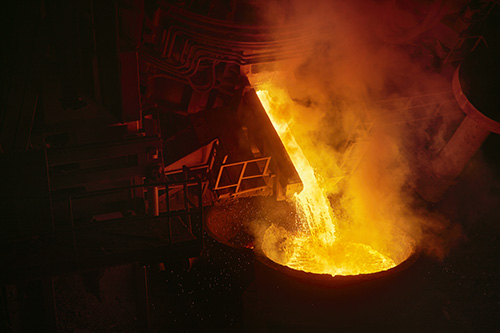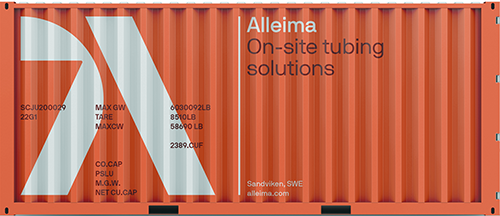It was the industry’s biggest announcement this year: Sandvik Materials Technology has separated from the Sandvik group and been renamed Alleima and listed on the Nasdaq Stockholm Exchange. As an independent company, Alleima is powering ahead as a world-leading manufacturer and seller of advanced stainless steels and alloys. The change has lit a fire in Alleima, energising its global team, who are excited about the change and brimming with enthusiasm. As company President Göran Björkman explained with a smile: “We feel like a 160-year-old start-up!”
By Joanne McIntyre
“The name Alleima – a combination of the words alloy and materials – represents a fresh opportunity for growth and development in the global market,” begins Mr. Björkman. “While we are leaders in the stainless and special alloy sector in terms of both technology leadership and financial performance, we were a relatively small part of the Sandvik group. As an independent company, the Alleima Board of Directors is fully focused on our activities, enabling us to deliver our strategy to grow profitably, and capital allocation will be much simpler. This move has energised our entire organisation and instilled a strong sense of pride.” The separation has not caused major changes for the company, customers, or employees. There have been no changes in production or support service processes. Alleima continues to control the supply chain from R&D to primary melt to the final product, and there will be no changes or reductions in the product portfolio.
Innovation and sustainability
The future strategy for Alleima is focused on four points:
1. Profitable growth,
2. Innovation and materials science,
3. Operational and commercial excellence,
4. Industry-leading sustainability.
The human face of sustainability
Innovations that allow people to live better, longer lives are an important human aspect of sustainability. Alleima produces special precision medical wire solutions for life-changing medical aids. Examples include hearing aids and cochlear implants for the hearing impaired, glucose sensors and insulin pumps for diabetics, brain implants for Parkinson’s patients, and guidewires, catheter reinforcements and pacing leads for cardiovascular and endovascular disorders.
“Sustainability remains a key focus for Alleima,” explains Mr. Björkman. “It has many facets which extend far beyond climate change and the circular economy. As a steel re-melter using arc furnaces powdered by fossil-free electricity, our CO2 footprint is already very small. Our global exposure for Scope 1 and 2 was around 150,000 tonnes/annum base year 2019, and we will reduce that by 50% by 2030. Today we have already reduced that by 16% to 125,000 tonnes/annum.”
“Given our position as a technology leader, one of the most significant impacts we can have is to support our customers’ sustainability goals. Examples are the rapidly evolving hydrogen and renewable energy sectors, where we are uniquely positioned with materials for fuel cells for electric vehicles (EV) and static storage. Alleima can make a difference in the value chain of renewable energies such as biofuel, biopower, geothermal, offshore wind and carbon capture and storage.”
Electrification
A building block of the global trend for sustainability is electrification, not only for EV but also for industrial power. Mr. Björkman: “Most of the industrialised heat treatments are gas-fueled. Our Kanthal company is an expert on electrical heating supporting the gas-to-electric trend, including for intensive energy consumers such as the steel and cement industries.”
The energy transition and the renewables sector are moving much faster than governments and legislation can keep up with, explains Mr. Björkman. “The market is driven by demand from end-users and consumers. While energy efficiency plays a role, companies and consumers will not use less energy in the future, so they need to have access to different energy sources. Electrification is a big part of that. The solution is to do the right thing for the planet while also being profitable. For Alleima, that’s no conflict whatsoever: sustainability is good business!”

High-tech innovators
With a history dating back 160 years, Alleima has recipes for 900 alloys to its name, a unique position in this industry. “Recycling is in our DNA; we’ve been doing this for over 100 years,” explains Mr. Björkman. “Our stainless alloys contain 82% recycled scrap, and we utilise machine learning and artificial intelligence to maximise the quality and quantity of recycled material in every melt. We can certify every batch to show customers the exact percentage of recycled product in each heat.” Alleima is not a traditional steel company, as it produces a relatively low volume of specialised, high-value alloys. “We’re a leading niche company producing premium products in advanced stainless steels and special alloys. Our broad customer base over many industry segments protects us from market volatility. For example, when the oil and gas prices crashed in 2021, we still had a very profitable year.”
“When I joined the company 32 years ago, analysts questioned the need for our extensive and costly research divisions. However, being fully integrated remains one of our greatest strengths. We have strong R&D and metallurgy teams and a uniquely global footprint. Most of our sales are made directly through our own sales organisation. Our financial performance demonstrates that we are a leading performer in our industry, and I’m very positive about the exciting future ahead of us.”
 “This change is a springboard to propel us into the future.” Göran Björkman
“This change is a springboard to propel us into the future.” Göran Björkman
 “Our customers will feel the new level of energy in the company.” Michael Andersson
“Our customers will feel the new level of energy in the company.” Michael Andersson
Tube division: a true knowledge partner
The Tube division makes up almost 70% of Alleima’s business and 3,600 of the company’s 5,500 employees work in this area. Head of the Tube division Michael Andersson explained how it serves the market with tubular products in stainless and special alloys, and long products such as bars and mining products.
“Being launched as an independent company under a new name is an exciting change. Our customers will feel the new level of energy in the company, but in terms of business execution, they will not see any change.”
The Tube division is strong in industry segments such as industrial, (petro) chemical, oil and gas, power generation and mining. From this robust platform, the division is now prioritising the development of future solutions for the sustainable energy transition. “Dedicated global teams are identifying the future needs of emerging energy markets,” explains Mr. Andersson.

“Society needs to transition, but the necessary technological solutions are not fully mature. Our tube division is exploiting the full power of our global R&D teams, technical marketing experts, material experts, and sales teams to help customers develop solutions. With so many uncertainties as to which energies will emerge as winners, we are balancing our efforts across solar, geothermal, biofuels, bioenergy such as waste-to-energy, and solutions and materials for the role of hydrogen.”
“Hydrogen may not ultimately emerge as an energy source, but it will enable the transition by handling the intermittent characteristics of renewable energy sources. Alleima is researching solutions both upstream for the production of hydrogen and downstream for storage and distribution. As always, our focus is on product forms and material developments to find new solutions for future technology needs.”
The success of Sanicro® 35
The new super austenitic alloy from Alleima Sanicro® 35 is proving to be a great success story.
Mr. Andersson: “This flagship material truly is a bridge between high-performance duplex grades and more costly nickel grades. Launched in 2020, we’ve had great feedback from the market, even though industries such as refining and (petro)chemical are by necessity very conservative about introducing new grades. An example of its success is the grade’s adoption into waste-to-energy projects.”
“Evolving renewable energies have processes that are not yet fully explored, and we are confident that our family of Sanicro® grades will fit in nicely. Many actors are relatively new, so we’re playing a crucial dual role in advising them on their material selection and providing materials solutions.” This advisory role has been a key part of the company’s success over the years, explains Mr. Andersson.
“We aim to be a knowledge provider and continue to invest heavily in the foundation of materials and a sizeable central and application-oriented R&D organisation. There is now a new industry developing – energy conversion – alongside renewable technologies, where we fulfil the same role.”

Regional footprint
A growing global trend is a move away from globalisation and towards increased regionalisation, explains Mr. Björkman. “Our fully integrated value chain and global footprint are key strengths. With manufacturing plants and sales offices in all regions, we are close to our customers and largely insulated from geopolitical volatility. In the past few months, the world has seen a clear trend for a regionalised, domestic move towards energy security, and we are ready to support this.”
Mr. Andersson explains that the Tube division has invested heavily in strengthening its regional footprint in recent years. “Our principal aim is to serve customers with production facilities and knowledge centres locally and regionally. This provides flexibility from a delivery point of view and allows us to adapt product characteristics to specific market needs. Over the last four years, we have strengthened our footprint in Asia-Pacific, Europe, and the Americas.”
“Any customers concerned about our separation from Sandvik can be assured that we still have full control over our supply chain from R&D to melting to delivery. There has been absolutely no change in scope. All knowledge and assets remain in place; it’s simply a name change. We will to use the knowledge and experience built up over the past 160 years to continue to grow and excel. This change is a springboard to propel us into the future,” smiles Mr. Björkman.
Micro-factories in a container
The Alleima innovative mobile micro-factory in a container can be placed wherever
the customer needs it, reducing waste, increasing safety and bringing both time and cost savings. The micro-factory allows customers to fabricate customised products on-demand and on-site. Digitalisation and automation have enabled many tasks to be conducted remotely, with a much smaller labour force than previously possible. The micro-factories are used across Europe, particularly for hydrogen infrastructure projects, and one was recently delivered to California.

About this Featured Story
This Featured Story appeared in Stainless Steel World September 2022 Annual Procurement Report. To read many more articles like these on an (almost) monthly basis, subscribe to our magazine (available in print and digital format).
Want to contribute as author? Please contact Joanne.
Every week we share a new Featured Story with our Stainless Steel community. Join us and let’s share your Featured Story on Stainless Steel World online and in print.


